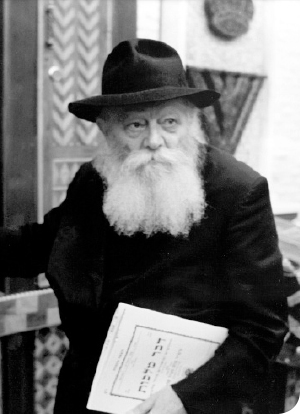Sources where the Rebbe proclaims that Moshiach has already been revealed. * From Chapter Seven of Rabbi Shloma Majeski’s Likkutei Mekoros (Underlined text is the compiler’s emphasis
Translated by Boruch Merkur
 13. […] According to all the signs mentioned by our Sages concerning the End of Days (in addition to the general Talmudic proclamation that “all the predicted dates [for the advent of Moshiach] have ended”), this generation is the final generation of exile and the first generation of redemption. My revered father in-law the Rebbe, leader of the generation, testified to the arrival of the new era with his well-known proclamation, “L’alter l’t’shuva ‘l’alter l’geula – immediately to repentance, immediately to redemption.” In his time (decades ago), all aspects of avoda had already been completed; now all that is needed is to “polish the buttons” and stand ready to greet Moshiach Tzidkeinu. How much more so after the vast amount of avoda done since then in the realm of disseminating Judaism, Torah, and the wellsprings of Chassidus outward. This is especially the case after having completed forty years (after his histalkus), when “a person attains the knowledge of his teacher,” “a heart to know, eyes to see, and ears to hear.” Now it is absolutely certain that we have even completed “polishing the buttons,” and we stand ready to greet Moshiach Tzidkeinu.
13. […] According to all the signs mentioned by our Sages concerning the End of Days (in addition to the general Talmudic proclamation that “all the predicted dates [for the advent of Moshiach] have ended”), this generation is the final generation of exile and the first generation of redemption. My revered father in-law the Rebbe, leader of the generation, testified to the arrival of the new era with his well-known proclamation, “L’alter l’t’shuva ‘l’alter l’geula – immediately to repentance, immediately to redemption.” In his time (decades ago), all aspects of avoda had already been completed; now all that is needed is to “polish the buttons” and stand ready to greet Moshiach Tzidkeinu. How much more so after the vast amount of avoda done since then in the realm of disseminating Judaism, Torah, and the wellsprings of Chassidus outward. This is especially the case after having completed forty years (after his histalkus), when “a person attains the knowledge of his teacher,” “a heart to know, eyes to see, and ears to hear.” Now it is absolutely certain that we have even completed “polishing the buttons,” and we stand ready to greet Moshiach Tzidkeinu.
This year, our preparedness for redemption is even further underscored, the year Hei-Tav-Nun-Sin-Alef, 5751, which alludes to the verse, “sinasei Malchuso – his kingship [is] exalted” throughout the entire world. (Here “his kingship” refers to Dovid and Shlomo, from whom Melech HaMoshiach descends.) Hei-Tav-Nun-Sin-Alef forms the acronym, “this year is (T’hei) Shnas Niflaos Er’enu – (It shall be) the year of I shall show you wonders,” “as in the days of your exodus from Egypt, I shall show you wonders,” beginning with the “wonders” that have already been seen (in addition to those that will be seen in the future – “I shall show you wonders”) in actuality, openly before all the nations. Indeed, it is these wonders that fulfill the words of the Yalkut Shimoni: “During the year that Melech HaMoshiach is reveled, all the kingdoms of the Gentile nations are embattled with one another, the Persian king … the Arabian king … and He (the Almighty) tells them (the Jewish people), ‘My children, fear not. All I have done I have done for your sake … the time of your redemption has arrived.” From that time (especially in the month of Nissan, the Month of Redemption) we are already “at the time of the advent of Melech HaMoshiach … (“Behold, he [Melech HaMoshiach] has come”) he proclaims to them, to the Jewish people, ‘Humble ones, the time of your redemption has arrived.”
This is especially the case as we are now at the time of Mattan Torah and the days following Shavuos, the days of Tashlumin, as it says in s’farim, noting the allusion in the words of our Sages, “All agree b’Atzeres d’ba’inan nami ‘lachem’ – that Shavuos requires also ‘to you’ [a component of enjoyment of the holiday in ways that people can appreciate]’” – for “Atzeres…is an appropriate and auspicious time to pray to draw the advent of the redemption closer, keitz ha’geula … ‘Ba’inan’ is a term from the phrase ‘im taviyun ba’u,’ a term of prayer and supplication. ‘Nami lachem’ is numerically equivalent to ‘keitz.’ The meaning of this gematria is that Shavuos is an auspicious time to pray for bringing the advent of redemption closer” – “Keitz ha’yamim” as well as “keitz ha’yamin.” Now, since it is the Shabbos after the “keitz” of Atzeres, Shabbos Parshas Naso, “Naso” (the acronym for a year of “Er’enu niflaos – I will show you wonders”) of “Tav-Nun-Shin-Alef – 5751” – it is the most auspicious time for bringing about the innovation of “A new Torah shall emerge from Me,” as well as, “The newly formed heavens and the new earth that I make” – stated not only in the future tense but in the present tense, to the extent that in the very next moment it will already be stated in the past tense, since “Behold, he [Melech HaMoshiach] has come” meaning that he has already arrived.
(From the address of Shabbos Parshas Naso, 12 Sivan; Seifer HaSichos 5751, pg. 595)